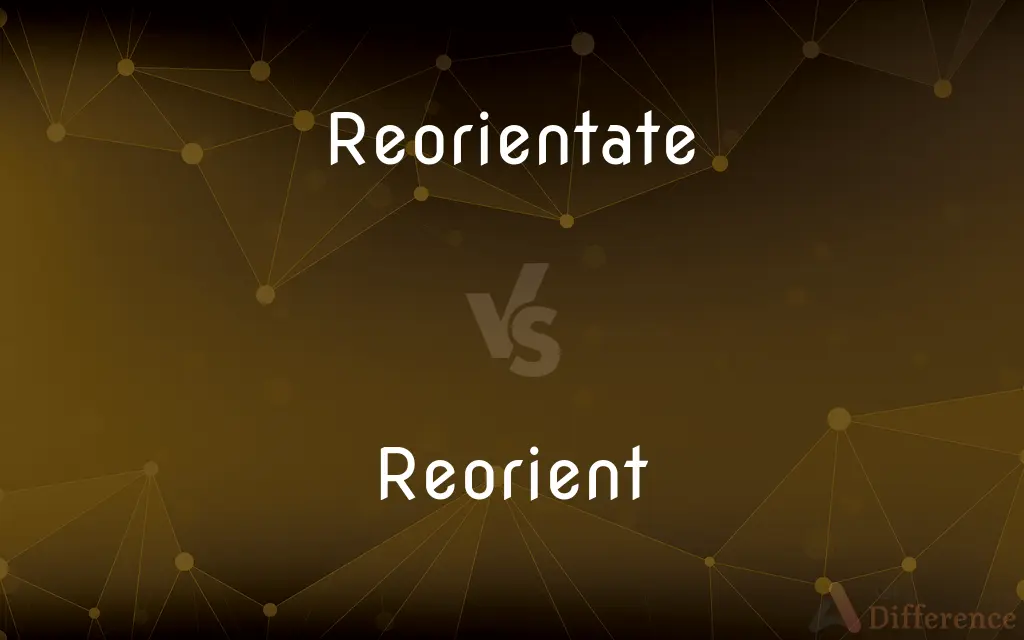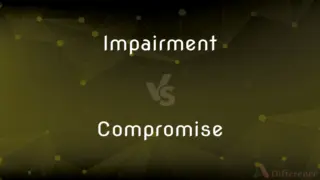Reorientate vs. Reorient — What's the Difference?
Edited by Tayyaba Rehman — By Urooj Arif — Updated on April 8, 2024
Reorientate and reorient both mean to change direction or focus, but "reorientate" is more commonly used in UK English.

Difference Between Reorientate and Reorient
Table of Contents
ADVERTISEMENT
Key Differences
Reorientate and reorient essentially have the same meaning, which is to adjust or align something in a new direction. The key difference lies in their usage; "reorientate" is more commonly used in British English, while "reorient" is preferred in American English. Both terms can apply to physical directions and metaphorical orientations, such as attitudes or approaches.
When discussing processes or actions, both terms imply a change in orientation or focus. For example, a company may reorient or reorientate its marketing strategy to better target a new demographic. The choice between the two often comes down to regional language preferences rather than any significant difference in meaning.
In the context of personal development or education, to reorient or reorientate oneself often means to adapt to new conditions or realities. This could involve a student reorienting their study habits to improve performance. Whether one uses "reorient" or "reorientate" in this context usually depends on the speaker's or writer's dialect.
Technologically, reorienting can refer to adjusting devices or systems to a new set of parameters or orientations. This usage is common in both technical and non-technical discussions, with "reorient" often being the preferred term in technical manuals, especially those written in American English.
Culturally, the terms can reflect shifts in societal norms or values. A society might reorient or reorientate its views on an issue due to changing attitudes or new information. Here, the choice of term might reflect the writer's or speaker's cultural background or the intended audience's linguistic preferences.
ADVERTISEMENT
Comparison Chart
Definition
Adjust or align something in a new direction.
Adjust or align something in a new direction.
Common Usage
More common in UK English.
Preferred in American English.
Application
Personal development, education, technology.
Personal development, education, technology.
Cultural Relevance
May reflect a British English speaker's preference.
Often used in American English contexts.
Technical Writing
Less common in technical manuals.
Frequently used in technical documentation.
Compare with Definitions
Reorientate
Changing the direction or focus of something.
The company decided to reorientate its business strategy towards sustainability.
Reorient
Altering the focus or direction of an endeavor.
The software team reoriented their efforts towards user experience improvements.
Reorientate
Adapting to new conditions or environments.
After moving abroad, she had to reorientate her social habits.
Reorient
Shifting public attitudes or values.
The campaign seeks to reorient societal views on recycling.
Reorientate
Shifting learning or teaching approaches.
The curriculum was reorientated to emphasize critical thinking.
Reorient
Modifying educational strategies or goals.
Teachers reoriented the syllabus to include more interactive learning.
Reorientate
Changing societal norms or perspectives.
The documentary aimed to reorientate public opinion on climate change.
Reorient
Adjusting devices or systems to new settings.
We reoriented the router to enhance the Wi-Fi coverage.
Reorientate
Aligning or setting up equipment anew.
The satellite dish was reorientated to improve signal reception.
Reorient
Changing one's approach or attitude.
He reoriented his priorities towards health and wellness.
Reorientate
(transitive) To orientate anew; to cause to face a different direction.
Reorient
Reorient was a Canadian online magazine focusing on contemporary Middle Eastern arts and culture. The magazine was founded in 2012 by Joobin Bekhrad who also edited the magazine.
Reorientate
Orient once again, after a disorientation
Reorient
(ambitransitive) To orient again; to make or become oriented after dislocation or disorientation.
Reorient
(obsolete) Arising again.
Reorient
Rising again.
The life reorient out of dust.
Reorient
Orient once again, after a disorientation
Reorient
Cause to turn
Reorient
Set or arrange in a new or different determinate position;
Orient the house towards the South
Common Curiosities
What is the difference between reorientate and reorient?
The main difference is regional preference; "reorientate" is more common in British English, while "reorient" is preferred in American English.
Is reorientate more formal than reorient?
Neither term is more formal than the other; the difference is primarily regional usage.
Can reorientate and reorient be used interchangeably?
Yes, they can be used interchangeably, though the choice may depend on the regional dialect of the speaker or writer.
Do reorientate and reorient apply only to physical directions?
No, they can also refer to metaphorical or abstract changes in direction, such as attitudes, approaches, or strategies.
Is reorientate used in American English?
While less common, "reorientate" can be found in American English, particularly in more formal or academic contexts.
Why would someone need to reorient themselves?
Changes in life circumstances, such as moving to a new city or changing careers, might require someone to reorient themselves.
Is one term preferred in technical contexts?
"Reorient" is more commonly used in technical documents, especially those written in American English.
How do I know whether to use reorientate or reorient?
Consider your audience and the regional English they use; this will guide your choice between the two terms.
Can a culture reorientate its values?
Yes, cultural values can shift over time, leading to a societal reorientation or reorientate toward new norms.
Is there a psychological aspect to reorientating?
Yes, reorientating can involve psychological adjustments, such as adopting a new mindset or perspective.
Does reorienting always involve a significant change?
Not always; it can refer to minor adjustments or shifts in direction or focus.
Can businesses reorientate their strategies?
Yes, businesses can reorientate (or reorient) their strategies to adapt to new markets or challenges.
How do technical fields view the terms reorientate and reorient?
Technical fields, especially in American English-speaking regions, tend to prefer "reorient" for its brevity and clarity.
How does education use reorientate or reorient?
In education, these terms refer to shifting teaching methods or learning strategies to better meet educational goals.
Are there any specific fields where reorientate is preferred?
"Reorientate" might be more commonly used in fields where British English is the norm, but it's not limited to specific areas.
Share Your Discovery

Previous Comparison
Impairment vs. Compromise
Next Comparison
Bergamot vs. CitronAuthor Spotlight
Written by
Urooj ArifUrooj is a skilled content writer at Ask Difference, known for her exceptional ability to simplify complex topics into engaging and informative content. With a passion for research and a flair for clear, concise writing, she consistently delivers articles that resonate with our diverse audience.
Edited by
Tayyaba RehmanTayyaba Rehman is a distinguished writer, currently serving as a primary contributor to askdifference.com. As a researcher in semantics and etymology, Tayyaba's passion for the complexity of languages and their distinctions has found a perfect home on the platform. Tayyaba delves into the intricacies of language, distinguishing between commonly confused words and phrases, thereby providing clarity for readers worldwide.















































